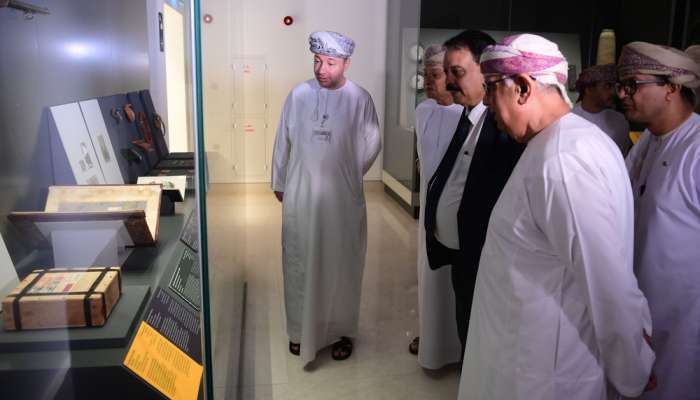
Muscat: The National Museum on Wendesday inaugurated the manuscript ‘Anis al-Hujjaj’. On loan from the Chhatrapati Shivaji Maharaj Vastu Sangrahalaya in Mumbai, India, this manuscript serves as an illustrated guide to pilgrimage to Mecca and related rituals.
The manuscript was written by Safi bin Vali Qazvin after his pilgrimage journey in 1676 CE to Mecca. The manuscript will be displayed for four months in the ‘Oman and the World Gallery’ at the National Museum.
“Anis al-Hajj” or “Anis al-Hujjaj” features 28 detailed illustrations depicting various ports in the Mughal Indian Sultanate and scenes from the pilgrimage.
The author comprehensively documented the journey, beginning with the departure of the Indian pilgrim caravan from the port of Surat, traversing the Arabian Sea, docking at various ports such as Mukha and Jeddah, and finally reaching Mecca.
Jamal Hassan Al Moosawi, Secretary-General of the National Museum, said in his speech during the ceremony: “The inauguration of the manuscript ‘Anis al-Hujjaj’ enhances awareness of Oman’s history and its strategic position as a hub of cultural and commercial exchange throughout the ages. The manuscript sheds light on an important historical period, the era of the Mughal Indian Sultanate, and contains (28) detailed illustrations, including those depicting the pilgrim fleet in the Arabian Sea off the coast of Oman. These illustrations document the types of wooden boats of that time, as well as the attire and looks of the travelers, among other details.”
In his turn, Amit Narang, Ambassador of India to the Sultanate of Oman said: “India and Oman have deep rooted bilateral and historical relations. The arrival of Anis-al-Hujjaj manuscript on loan to the National Museum of Oman is a testimony to the excellent cooperation between the Museums and institutions of art and heritage of both countries.
Meanwhile, Dr. Buddha Rashmi Mani, the Director-General of the National Museum in New Delhi said that the Pilgrim’s Companion or Anis-ul-Hujjaj, the manuscript that has travelled from India on display, is a manuscript par excellence belonging to the medieval, Mughal period in India.
Anis-ul-Hujjaj brings to light various facets of the period including the glory of holy pilgrim sites of Hajj and Umrah, requisite and preparations for pilgrimage, recommendations on sea routes that connect India to the Gulf, specifications of sea vessels/ships, medicinal details, and above all subjects like charity and welfare of poor people along with moral guidance to the pilgrims, among many other aspects.
It is worth noting that Chhatrapati Shivaji Maharaj Vastu Sangrahalaya, formerly known as the Prince of Wales Museum of Western India, is one of the premier art and history museums in India.
It was established in 1909. Situated on the southern tip of Mumbai on the ‘Crescent Site’, the Museum building is a fine example of the Indo-Saracenic style of architecture. -ONA